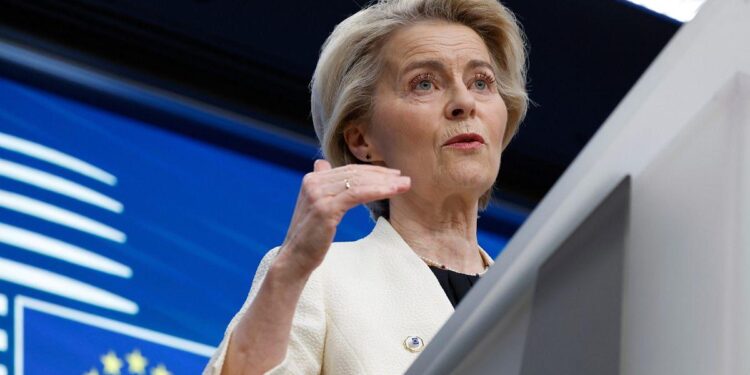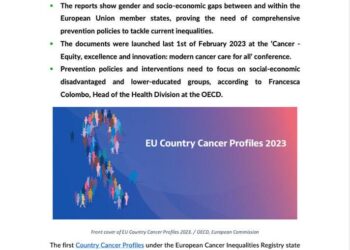In response to the imposition of tariffs by the Trump administration, the European Union has carefully calibrated its countermeasures, seeking a balanced approach that protects its economic interests while maintaining diplomatic channels. As trade tensions escalate, the EU has introduced targeted tariffs aimed at specific U.S. goods, balancing the need for assertiveness with a spirit of negotiation.This article examines the nuances of the EU’s strategy, highlighting its implications for transatlantic relations and the broader global trade landscape. With economic stakes high on both sides of the Atlantic, understanding the EU’s measured response is crucial for grasping the evolving dynamics of international trade in an age of protectionism.
EU’s Strategic Response to U.S. Tariffs Aiming for economic Stability
The European Union has responded strategically to U.S. tariffs with a series of countermeasures designed to protect its economic interests while minimizing disruption to the global market. Key actions include:
- Targeted Retaliation: The EU has imposed tariffs on selected U.S. imports, specifically targeting sectors that hold meaningful importance to American manufacturers and farmers.
- Diversification of Trade Partners: The EU aims to expand its trade relationships beyond the United States, focusing on regions such as Asia and South America to reduce dependency on the U.S. market.
- Support for Affected industries: Financial assistance and policy support have been provided to industries most adversely affected by the tariffs, ensuring stability in critical sectors.
In tandem with these measures, the EU is also prioritizing diplomatic engagement with the U.S. Administration to seek resolution and advocate for fair trade practices. This balanced approach aims to create a pathway forward that promotes:
- Negotiated Settlements: Efforts to bring both sides back to the negotiating table to discuss tariffs and trade agreements.
- Strengthening Internal Markets: Initiatives to bolster the EU’s internal market,enhancing resilience against external shocks.
- Long-Term Strategic Planning: A commitment to developing a more cohesive EU-wide economic strategy that can withstand future trade conflicts.
Balancing Trade: How the EU is Supporting Affected Industries
The European Union is implementing a multifaceted strategy to mitigate the repercussions of tariffs imposed by the Trump administration, ensuring that affected industries receive necessary support. Targeted aid measures are being established to help sectors suffering from increased import costs and decreased competitiveness.Key initiatives include:
- Financial Aid programs: Direct financial assistance to businesses in vulnerable sectors such as steel and aluminum, helping them adapt to market shifts.
- Trade Adjustment Assistance: Training programs aimed at upskilling workers who lost jobs or faced reduced hours due to the tariffs.
- Investment in Innovation: Funding for research and development projects to enhance productivity and foster innovation in affected industries.
To facilitate a lasting recovery, the EU is also focusing on strengthening its internal market, encouraging businesses to explore new partnerships and diversify supply chains. The Commission is collaborating with member states to implement region-specific strategies that target local economic needs. This approach includes:
- Regional Support Programs: Customized financial incentives for local firms struggling becuase of trade disruptions.
- Facts Campaigns: Resources aimed at educating businesses on how to navigate the complex landscape of global trade.
- Collaboration with Trade Unions: Ensuring that workers’ voices are heard in the transition process to build a more resilient economy.
| Sector | Support Measure | Status |
|---|---|---|
| Steel | Financial Aid | Implemented |
| Aluminum | Trade Assistance | in Progress |
| Agriculture | Market Diversification | Proposed |
future Recommendations for Maintaining Transatlantic Relations Through Fair Trade Policies
To ensure the sustainability of transatlantic relations, it is essential for both the EU and the U.S. to adopt fair trade policies that promote mutual economic interests while respecting international trade norms. Stakeholders should prioritize the establishment of a bilateral trade framework that emphasizes:
- Open Dialogue: Regular engagement between EU and U.S. trade representatives to address concerns and seek collaborative solutions.
- Equitable Market Access: Policies that facilitate smooth access for businesses on both sides of the Atlantic, reducing barriers and boosting trade volumes.
- consumer Protection: Standards that ensure the safety and quality of goods, fostering trust among consumers in both markets.
Moreover, leveraging data analytics and technology can further enhance trade efficiency. By implementing trade monitoring systems that track the impacts of tariffs and subsidies, both regions can adapt their policies based on empirical evidence. We recommend creating a joint task force that focuses on:
| Focus Area | Goals |
|---|---|
| Tariff Evaluation | Assess the effectiveness of tariffs and their economic impact. |
| Market Trends | Analyze shifts in consumer demand within both markets. |
| Sustainability practices | Promote green innovations in trade among businesses. |
In Summary
As the transatlantic trade landscape continues to evolve in the wake of former President Trump’s tariffs, the European union stands firm in its commitment to a balanced and strategic response. The aim is not only to protect its own economic interests but also to foster a more equitable trade habitat. By implementing countermeasures that are measured and calculated, the EU demonstrates its resolve to engage in meaningful dialogue while safeguarding its industries and consumers. The pathway forward remains fraught with challenges, yet the EU’s approach underscores its determination to navigate the complexities of global trade with both resilience and diplomacy. As negotiations unfold and new policies emerge,all eyes will be on how these measures shape the future of EU-U.S.relations and the broader international trade framework.















